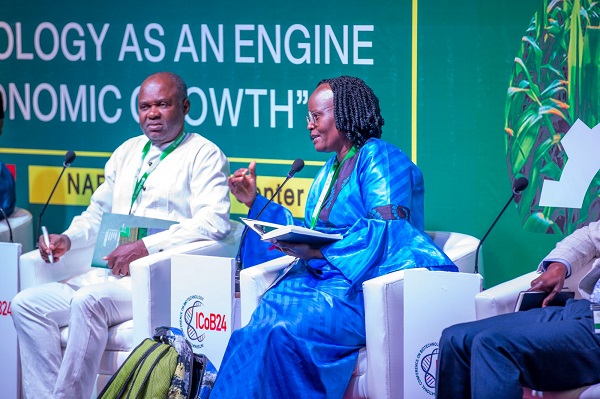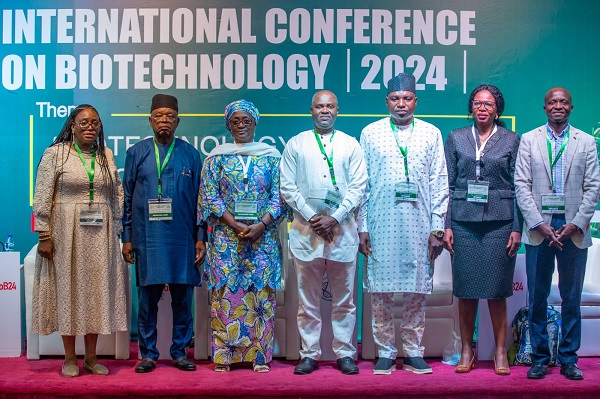
Director of the International Service for the Acquisition of Agri-biotech Applications (ISAAA) AfriCentre, Dr. Margaret Karembu has emphasised the importance of building trust, credibility and competencies among developers, regulators, communicators and consumers to realise the potential of new agri-innovations.
This call was made during her presentation titled “Is Communication Matching up with New Agri-biotech Innovations? Reflections from Africa Biennial Biosciences Communication Symposium (ABBC) 2023” at the ongoing International Conference on Biotechnology 2024 (ICoB24) in Abuja.
Drawing lessons from the ABBC symposium, Karembu highlighted that trust is paramount. She called for the establishment of a community of practice for science communication and stressed the need to develop appropriate messages that resonate with diverse stakeholders’ interests. She recommended mapping stakeholders according to their needs and values to manage conflicting expectations effectively.
Karembu listed several recommendations for effective communication about modern biotech, including crops and animals. She emphasised the importance of aligning communication with the audience’s value system to strengthen credibility, enhancing message believability by establishing a personal touch between scientists and the audience and shifting the message carriers from scientists to end-users, such as farmers and consumers.
During a technical panel session on the theme “Global Food Security: Role of Biotechnology in Feeding a Growing Population,” national president of the Plant Breeders Association of Nigeria (PBAN), Prof. Terkimbi Vange discussed the crucial role of biotechnology in global food security. With the global population projected to reach 9.7 billion by 2050, Vange stressed that traditional agriculture alone cannot meet the demand without harming the environment. Therefore, biotechnology is essential.

“Advances like GMOs, marker-assisted selection, and genome editing create crops that are more resilient, higher yielding, and nutritionally improved, reducing the need for chemicals and promoting sustainability,” Vange said. He highlighted that effective integration of biotechnology requires strong regulatory frameworks, public acceptance, equitable access and collaboration among governments, research institutions, the private sector and civil society. Developing countries need support to build capacity and empower local scientists and farmers and policies must address ethical, environmental and socio-economic issues to create an inclusive and sustainable food system.
Vange added that biotechnology promises to address global food security challenges by leveraging scientific advances, fostering collaboration, and ensuring equitable access, making sustainable and resilient food security achievable. He stressed that continued investment and support for biotechnological innovations are vital for securing food security for all.
Earlier, in his presentation “Scaling-up ACReSAL’s Reach and Impact: Strategies for Sustainable Agricultural Development in Northern Nigeria,” national project coordinator of ACReSAL, Prince Abdulhamid Umar highlighted Nigeria’s diverse climate, ranging from arid in the north to tropical in much of the country, and its vulnerability to climate risks.
“It is projected that the duration of heat waves will increase, with the largest increases in the north. Climate change is profoundly affecting Nigeria’s economy, causing declines in agricultural productivity and related activities. Agricultural yield has already declined by 50 per cent in some parts of the north due to low soil fertility. Nigeria faces high water scarcity, which not only threatens food security, livelihoods, and productivity but also exacerbates fragility and increases the risk of violence,” Umar said.
Underscoring the need for biotechnological solutions and innovations to tackle these challenges, Umar highlighted the importance of partnering with the National Biotechnology, Research & Development Agency to deploy innovations to address climatic challenges. “The ACReSAL project aims to restore 1 million hectares of degraded land. Achieving this requires innovative technologies and sustainable practices. ACReSAL will need to align with the National Biotechnology, Research & Development Agency for upscaling agricultural development and environmental sustainability in Northern Nigeria. Promoting sustainable agricultural development and food security in the drylands of Northern Nigeria requires ecologically specific and cost-effective agricultural and environmental biotechnological tools and practices,” he stated.
Umar, who was represented by the climate change specialist for ACReSAL, Mrs. Henrietta Al-Hassan and the agricultural expert advisor for ACReSAL, Mr. Cyril Bikom, expressed optimism that the conference would produce a catalogue of biotechnological tools useful for restoring wetlands and other degraded lands through positive partnerships and collaborations in the near future.


